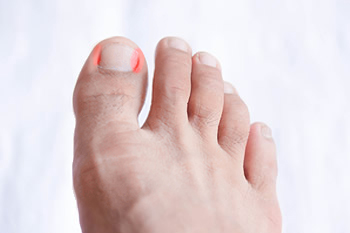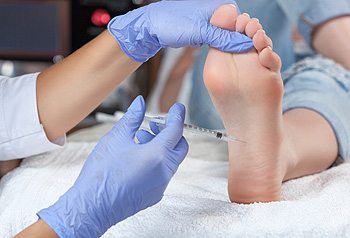
 When a toenail grows into the skin instead of over it, it is referred to as an ingrown toenail. The symptoms that are often accompanied with this condition can consist of tenderness, redness, and swelling. Common reasons for this condition to manifest may include wearing shoes that do not have adequate room for the toes to move freely in, cutting the toenail too short, or from an injury that has happened to the toe. Patients who have ingrown toenails that are not infected may find mild relief when the foot is soaked in warm water. This may enable you to gently move the nail away from the skin it has grown into. If you have developed this ailment, it is suggested that you consult with a podiatrist who can properly treat infected and uncomfortable ingrown toenails.
When a toenail grows into the skin instead of over it, it is referred to as an ingrown toenail. The symptoms that are often accompanied with this condition can consist of tenderness, redness, and swelling. Common reasons for this condition to manifest may include wearing shoes that do not have adequate room for the toes to move freely in, cutting the toenail too short, or from an injury that has happened to the toe. Patients who have ingrown toenails that are not infected may find mild relief when the foot is soaked in warm water. This may enable you to gently move the nail away from the skin it has grown into. If you have developed this ailment, it is suggested that you consult with a podiatrist who can properly treat infected and uncomfortable ingrown toenails.
Ingrown toenails may initially present themselves as a minor discomfort, but they may progress into an infection in the skin without proper treatment. For more information about ingrown toenails, contact Dr. Alan J. Spector of Shore Podiatry. Our doctor can provide the care you need to keep you pain-free and on your feet.
Ingrown Toenails
Ingrown toenails are caused when the corner or side of a toenail grows into the soft flesh surrounding it. They often result in redness, swelling, pain, and in some cases, infection. This condition typically affects the big toe and may recur if it is not treated properly.
Causes
You are more likely to develop an ingrown toenail if you are obese, have diabetes, arthritis, or have any fungal infection in your nails. Additionally, people who have foot or toe deformities are at a higher risk of developing an ingrown toenail.
Symptoms
Some symptoms of ingrown toenails are redness, swelling, and pain. In rare cases, there may be a yellowish drainage coming from the nail.
Treatment
Ignoring an ingrown toenail can have serious complications. Infections of the nail border can progress to a deeper soft-tissue infection, which can then turn into a bone infection. You should always speak with your podiatrist if you suspect you have an ingrown toenail, especially if you have diabetes or poor circulation.
If you have any questions, please feel free to contact our office located in Point Pleasant, NJ . We offer the newest diagnostic and treatment technologies for all your foot care needs.
Diabetes can cause potential foot conditions to develop, which may include diabetic foot ulcers. This typically occurs when wounds on the feet do not heal properly and become infected. If these ulcers are left untreated, it may lead to gangrene, and possible amputation. Many diabetic patients suffer from neuropathy. The symptoms of this condition consist of experiencing a tingling or numbing sensation on the feet, wounds in which the pain is not felt, and the feet may feel cold. It is important to have the toenails properly trimmed, and it is recommended that this be performed by a podiatrist. This can prevent the painful condition that is known as ingrown toenails from developing. Additionally, if you are diabetic, it is advised that you are under the care of a podiatrist who can help you manage your diabetes.
Diabetic foot care is important in preventing foot ailments such as ulcers. If you are suffering from diabetes or have any other concerns about your feet, contact Dr. Alan J. Spector from Shore Podiatry. Our doctor can provide the care you need to keep you pain-free and on your feet.
Diabetic Foot Care
Diabetes affects millions of people every year. The condition can damage blood vessels in many parts of the body, especially the feet. Because of this, taking care of your feet is essential if you have diabetes, and having a podiatrist help monitor your foot health is highly recommended.
The Importance of Caring for Your Feet
Patients with diabetes should have their doctor monitor their blood levels, as blood sugar levels play such a huge role in diabetic care. Monitoring these levels on a regular basis is highly advised.
It is always best to inform your healthcare professional of any concerns you may have regarding your feet, especially for diabetic patients. Early treatment and routine foot examinations are keys to maintaining proper health, especially because severe complications can arise if proper treatment is not applied.
If you have any questions please feel free to contact our office located in Point Pleasant, NJ . We offer the newest diagnostic and treatment technologies for all your foot and ankle needs.
 Did you know that diabetes is responsible for over 50% of all foot amputations in the United States? That is why diabetes experts recommend that everyone, whether they have type 1 or type 2 diabetes, protect their feet with daily foot checks, wear supportive fitting socks and shoes, and complete a comprehensive foot exam by a podiatrist at least once a year. Two main foot problems that can occur with people who have diabetes are Peripheral Vascular Disease and Diabetic Neuropathy. Other foot symptoms associated with people who have diabetes include loss of feeling, numbness or tingling sensations, blisters, skin discoloration, red streaks, and staining on their socks. If an infection develops the symptoms can worsen and include fever, chills, uncontrollable blood sugar, shock, and redness. With diabetes, since there can be numerous complications in the feet, it is strongly recommended that you consult with a podiatrist for the best prevention and treatment methods.
Did you know that diabetes is responsible for over 50% of all foot amputations in the United States? That is why diabetes experts recommend that everyone, whether they have type 1 or type 2 diabetes, protect their feet with daily foot checks, wear supportive fitting socks and shoes, and complete a comprehensive foot exam by a podiatrist at least once a year. Two main foot problems that can occur with people who have diabetes are Peripheral Vascular Disease and Diabetic Neuropathy. Other foot symptoms associated with people who have diabetes include loss of feeling, numbness or tingling sensations, blisters, skin discoloration, red streaks, and staining on their socks. If an infection develops the symptoms can worsen and include fever, chills, uncontrollable blood sugar, shock, and redness. With diabetes, since there can be numerous complications in the feet, it is strongly recommended that you consult with a podiatrist for the best prevention and treatment methods.
Diabetic foot care is important in preventing foot ailments such as ulcers. If you are suffering from diabetes or have any other concerns about your feet, contact Dr. Alan J. Spector from Shore Podiatry. Our doctor can provide the care you need to keep you pain-free and on your feet.
Diabetic Foot Care
Diabetes affects millions of people every year. The condition can damage blood vessels in many parts of the body, especially the feet. Because of this, taking care of your feet is essential if you have diabetes, and having a podiatrist help monitor your foot health is highly recommended.
The Importance of Caring for Your Feet
Patients with diabetes should have their doctor monitor their blood levels, as blood sugar levels play such a huge role in diabetic care. Monitoring these levels on a regular basis is highly advised.
It is always best to inform your healthcare professional of any concerns you may have regarding your feet, especially for diabetic patients. Early treatment and routine foot examinations are keys to maintaining proper health, especially because severe complications can arise if proper treatment is not applied.
If you have any questions please feel free to contact our office located in Point Pleasant, NJ . We offer the newest diagnostic and treatment technologies for all your foot and ankle needs.
 Elevated uric acid levels in the bloodstream may lead to a painful condition that is known as gout. It typically affects the joints in the big toe, and symptoms generally consist of swelling, redness, and severe pain and discomfort. It can occur as a result of crystals that form and lodge in the joints, which is caused by eating foods that have high purine levels. These foods can include red meat, shellfish, and excess amounts of alcohol. After a proper diagnosis is performed, which can consist of extracting fluid from the affected joint that contains the crystals, proper treatment can begin. This can include taking medication which can lower uric acid levels. There are methods that can be implemented which may prevent gout attacks from occurring. It is beneficial to incorporate healthy eating habits into your daily routine, and limiting the amount of alcohol that is consumed. If you have frequent gout attacks, it is suggested that you consult with a podiatrist who can treat this condition.
Elevated uric acid levels in the bloodstream may lead to a painful condition that is known as gout. It typically affects the joints in the big toe, and symptoms generally consist of swelling, redness, and severe pain and discomfort. It can occur as a result of crystals that form and lodge in the joints, which is caused by eating foods that have high purine levels. These foods can include red meat, shellfish, and excess amounts of alcohol. After a proper diagnosis is performed, which can consist of extracting fluid from the affected joint that contains the crystals, proper treatment can begin. This can include taking medication which can lower uric acid levels. There are methods that can be implemented which may prevent gout attacks from occurring. It is beneficial to incorporate healthy eating habits into your daily routine, and limiting the amount of alcohol that is consumed. If you have frequent gout attacks, it is suggested that you consult with a podiatrist who can treat this condition.
Gout is a painful condition that can be treated. If you are seeking treatment, contact Dr. Alan J. Spector from Shore Podiatry. Our doctor will treat your foot and ankle needs.
What Is Gout?
Gout is a form of arthritis that is characterized by sudden, severe attacks of pain, redness, and tenderness in the joints. The condition usually affects the joint at the base of the big toe. A gout attack can occur at any random time, such as the middle of the night while you are asleep.
Symptoms
Risk Factors
Prior to visiting your podiatrist to receive treatment for gout, there are a few things you should do beforehand. If you have gout you should write down your symptoms--including when they started and how often you experience them, important medical information you may have, and any questions you may have. Writing down these three things will help your podiatrist in assessing your specific situation so that he or she may provide the best route of treatment for you.
If you have any questions, please feel free to contact our office located in Point Pleasant, NJ . We offer the newest diagnostic and treatment technologies for all your foot care needs.
Read more about Everything You Need to Know About Gout